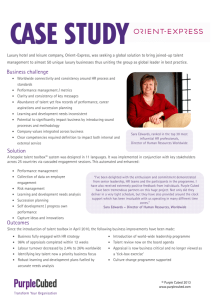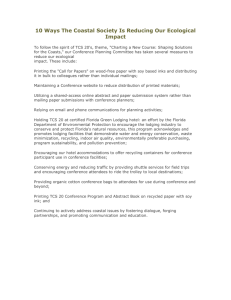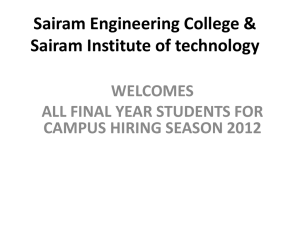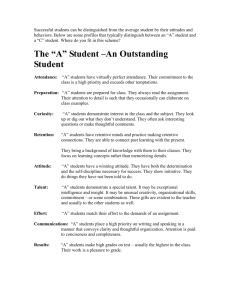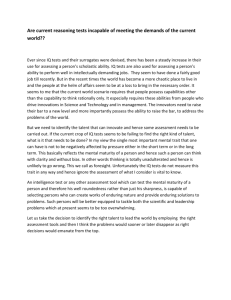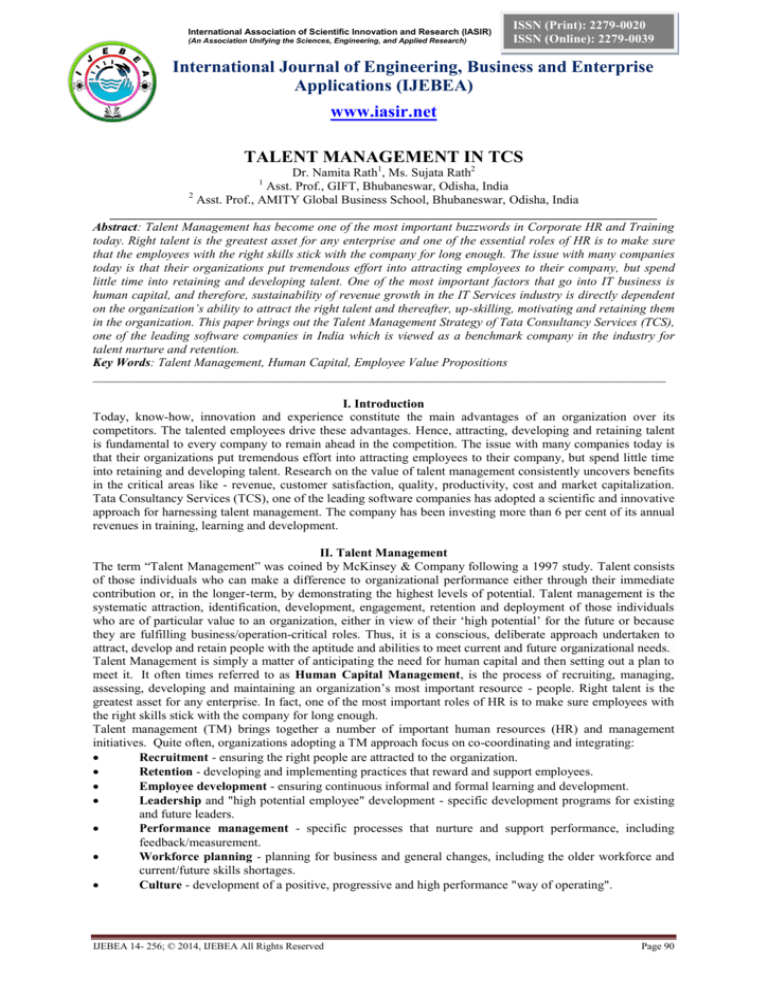
International Association of Scientific Innovation and Research (IASIR)
(An Association Unifying the Sciences, Engineering, and Applied Research)
ISSN (Print): 2279-0020
ISSN (Online): 2279-0039
International Journal of Engineering, Business and Enterprise
Applications (IJEBEA)
www.iasir.net
TALENT MANAGEMENT IN TCS
Dr. Namita Rath1, Ms. Sujata Rath2
Asst. Prof., GIFT, Bhubaneswar, Odisha, India
2
Asst. Prof., AMITY Global Business School, Bhubaneswar, Odisha, India
_____________________________________________________________________________________
Abstract: Talent Management has become one of the most important buzzwords in Corporate HR and Training
today. Right talent is the greatest asset for any enterprise and one of the essential roles of HR is to make sure
that the employees with the right skills stick with the company for long enough. The issue with many companies
today is that their organizations put tremendous effort into attracting employees to their company, but spend
little time into retaining and developing talent. One of the most important factors that go into IT business is
human capital, and therefore, sustainability of revenue growth in the IT Services industry is directly dependent
on the organization’s ability to attract the right talent and thereafter, up-skilling, motivating and retaining them
in the organization. This paper brings out the Talent Management Strategy of Tata Consultancy Services (TCS),
one of the leading software companies in India which is viewed as a benchmark company in the industry for
talent nurture and retention.
Key Words: Talent Management, Human Capital, Employee Value Propositions
_________________________________________________________________________________________
1
I. Introduction
Today, know-how, innovation and experience constitute the main advantages of an organization over its
competitors. The talented employees drive these advantages. Hence, attracting, developing and retaining talent
is fundamental to every company to remain ahead in the competition. The issue with many companies today is
that their organizations put tremendous effort into attracting employees to their company, but spend little time
into retaining and developing talent. Research on the value of talent management consistently uncovers benefits
in the critical areas like - revenue, customer satisfaction, quality, productivity, cost and market capitalization.
Tata Consultancy Services (TCS), one of the leading software companies has adopted a scientific and innovative
approach for harnessing talent management. The company has been investing more than 6 per cent of its annual
revenues in training, learning and development.
II. Talent Management
The term “Talent Management” was coined by McKinsey & Company following a 1997 study. Talent consists
of those individuals who can make a difference to organizational performance either through their immediate
contribution or, in the longer-term, by demonstrating the highest levels of potential. Talent management is the
systematic attraction, identification, development, engagement, retention and deployment of those individuals
who are of particular value to an organization, either in view of their ‘high potential’ for the future or because
they are fulfilling business/operation-critical roles. Thus, it is a conscious, deliberate approach undertaken to
attract, develop and retain people with the aptitude and abilities to meet current and future organizational needs.
Talent Management is simply a matter of anticipating the need for human capital and then setting out a plan to
meet it. It often times referred to as Human Capital Management, is the process of recruiting, managing,
assessing, developing and maintaining an organization’s most important resource - people. Right talent is the
greatest asset for any enterprise. In fact, one of the most important roles of HR is to make sure employees with
the right skills stick with the company for long enough.
Talent management (TM) brings together a number of important human resources (HR) and management
initiatives. Quite often, organizations adopting a TM approach focus on co-coordinating and integrating:
Recruitment - ensuring the right people are attracted to the organization.
Retention - developing and implementing practices that reward and support employees.
Employee development - ensuring continuous informal and formal learning and development.
Leadership and "high potential employee" development - specific development programs for existing
and future leaders.
Performance management - specific processes that nurture and support performance, including
feedback/measurement.
Workforce planning - planning for business and general changes, including the older workforce and
current/future skills shortages.
Culture - development of a positive, progressive and high performance "way of operating".
IJEBEA 14- 256; © 2014, IJEBEA All Rights Reserved
Page 90
Namita Rath et al., International Journal of Engineering, Business and Enterprise Applications, 8(1), March-May., 2014, pp. 90-93
Successful talent management is not just about recruiting, retaining and developing a high-performing
workforce but also aligning their talent management practices with their culture, values and strategic goals and
the integration of these programmers across the entire organizations. An important step in talent management is
to identify the employees (people and positions) that are critical to the organization. At present, the skill
shortages and the ageing workforce are also helping organizations to focus on the talent management. Many
leading companies have decided to develop their own people, rather than trying to hire fully skilled workers. In
summary, every organization should be implementing talent management principles and approaches.
III. Literature Review
Workplaces everywhere are obsessed with employee engagement. Engaged workers are more productive,
perform better, motivate others and, perhaps most importantly – stay. So, it is also no surprise that in a labor
market such as India where attrition rates of 20-30 % are normal and 50 % in industries such as IT not unheard
of, serious questions about engagement are being asked (Smith, 2012). A recent Mercer survey highlights that
no fewer than 54 % of Indian workers are seriously considering leaving their jobs, and that figure spikes to 66 %
in the 16-24 year age bracket.
It is interesting to note that approximately 75 % of the IT personnel are younger than age 45. Many managers in
the IT industries are in their 20’s and 30’s therefore making it more difficult to manage and retain them (Shayo,
2004).
According to LBW Consulting (Leadership in Business Worldwide), the cost of replacing an employee ranges
from 29 % (non-management) to 46 % (management) of the person's annual salary. Expenses are also incurred
when someone else does the person's job in the interim, leading to a domino effect on employee cost. (Singh,
2012)
Good employees want to develop new knowledge and skills in order to improve their value in the marketplace
and enhance their own self-esteem. (Irwin, 2011) Therefore, it is wise to plan the first initial days of his work
and train him for the work he is going to perform in the office, rather than leaving him on his own. Leading
employers see this not as a cost but an opportunity to both harness worker potential as well as a talent attraction
and retention lever (Smith, 2012).
IV. Talent Management in TCS
The human resources strategy of Tata Consultancy Services (TCS), the largest provider of information
technology (IT) and business process outsourcing (BPO) services in India has enabled the Company to attract,
integrate, develop and retain the best talent required for driving business growth. The sustained strategic focus
to enhance employee capability, improve efficiency and groom future leaders has helped TCS to maintain its
benchmark status in the IT industry.
As on March 31, 2013 the Company employed 2,76,196 associates representing 118 nationalities deployed
across 55 countries. The 'workforce management strategy' is executed optimally to fulfill business demand,
deliver consistently high utilization rates and keep manpower costs within the desired range. The Company has
created a performance driven environment where innovation is encouraged, performance is recognized and
employees are motivated to realize their potential. Its relentless pursuit to connect with employees on a regular
basis, communicate in an open and transparent manner, provide opportunities to learn and grow within the
organization have yielded desired results as is evident from the high retention rates and the motivation and
engagement levels of its employees.
The attrition rate at TCS in 2006 was 10.6 % which was the lowest in the Indian software and IT industry. As
TCS continued to expand globally, it faced the challenge of grooming and retaining a diversified talent pool.
Also with rising manpower requirement, TCS increasingly hired non-technical science graduates, which posed a
challenge to groom and bring them on a common platform. A small experiment called “Ignite” was started in
December 2006 to strengthen the company’s talent base. It was launched to hire, train and deploy two batches of
trainees from non-technical science background.
Initially, TCS recruited engineers to meet its needs at the business front. But, later on to expand and increase its
scalability, the company felt the need to have a more diverse team in terms of intellectual, social and culture
context. In February 2009, TCS changed its hiring strategy and started focusing on just-in-time hiring or realtime talent management. To build a quality talent pool, TCS started a programme called Academic Interface
Programme (AIP). Also, various kinds of training programmes were conducted at TCS - Learning and
Development, Initial Learning Programmme, Continuous Learning Programme, Leadership Development
Programme, Foreign Language Initiative and Workplace Learning. Compensation management system at TCS
is based on the economic value added (EVA) model. The company conducts appraisal of its regular employees
twice in a year, and also at the end of the project in case of employees hired specifically for various projects. In
order to identify its outstanding talent, TCS has been recognizing the contribution of its people in many ways.
In 1997, TCS set up a state-of-the-art training centre, ‘Technopark’ at Thiruvananthapuram which offers
training to new recruits and TCS staffers at various levels. ‘Technopark’ provided the employees with three
IJEBEA 14- 256; © 2014, IJEBEA All Rights Reserved
Page 91
Namita Rath et al., International Journal of Engineering, Business and Enterprise Applications, 8(1), March-May., 2014, pp. 90-93
kinds of training programmes - technology, attitudes and management. TCS has a Manpower Allocation Task
Committee (MATC) which determined the career path for employees.
V. Learning and Development
The Company continued to invest in enhancing its human capital through building skills and competencies for
its associates. It has brought a paradigm shift in the learning process which is called the next-gen learning &
development (L&D). The learning eco-system has been transformed by investing in interactive classrooms,
video based training and social media enabled social learning. 'Any Time-Any Where' learning has become a
reality in TCS. The new recruits from colleges are trained to be IT professionals through its elaborate initial
learning programme. It has expanded its training infrastructure capacity by building a state of the art training
center in Thiruvananthapuram with a capacity to accommodate 15,000 trainees.
VI. Talent Management, Leadership Development and Talent Retention
The performance and career management processes of TCS are fully globalised. Digitized systems have been
enhanced and new 'Career Hub' has been launched for streamlining the process of recording aspirations,
identifying high potentials, mentoring and tracking career movement of employees.
The culture of reward and recognition in TCS is aided by 'TCS Gems', the global reward and recognition tool,
with well-defined criteria and processes to enhance performance. The Company participated in multiple
compensation surveys in India and other geographies to ensure that its compensation and rewards strategy
remains competitive.
A healthy leadership pipeline is maintained through the layered framework of' Leadership Development
Programmes (LDP), focusing on developing behavioural, business and people competencies. Potential leaders
are identified and are nurtured through LDPs, and given challenging roles to build leadership capability. TCS
has tied up with globally recognized coaching agencies to provide coaching intervention to its leaders.
The organization culture of open communication is supported through a highly flexible and transparent internal
social networking platform. It empowers employees to articulate their feelings freely, exchange ideas and
contribute to the organizational growth. In addition to this, regular connect with the employees helps to
understand the pulse of the organization and take appropriate measures to keep the workforce engaged and
motivated.
A number of non-work related employee engagement initiatives such as fun events, sports, cultural activities
and volunteering for social causes are organized across the globe under its employee engagement platform
known as 'Maitree'. The culture of volunteering helps employee bonding within the organization and reduces
stress at work. Employees are also encouraged to involve their families in these activities. Employee health and
safety are of crucial importance. Fit4Life, health awareness sessions, periodic medical check-ups, gymnasiums
in offices and 24x7 'Employee Assistance Programme' are some of the important initiatives undertaken by the
Company to encourage health consciousness.
In fact, the employee engagement initiatives and various HR interventions have helped the company to control
attrition. Today, TCS remains the industry benchmark for talent retention. Its attrition rate including BPO has
come down to 10.60 % in 2013, as compared to 12.20 % in 2012.
VII. Talent Diversity
The Company employed persons from 118 different nationalities. The number of non-Indian nationals was
21,282 as at March 31, 2013 (17,329 as of March 31, 2012). Efforts are made continuously to integrate
differently-abled individuals into the workforce. Efforts are also made to increase recruitment of individuals
belonging to disadvantaged sections of society.
TCS proactively creates an environment of inclusion to attract and retain women. Women constituted 32.40 %
of the Company's workforce as on March 31, 2013 (31.60 % as on March 31, 2012). Its progressive policies and
customized programmes such as executive education programme for women in mid-management, interactive
forums and women discussion circles address the aspirations and needs of its women employees. Special
initiatives are also taken to strengthen cultural orientation of employees and help drive "One TCS Culture"
across the organization. A learning module has been created specifically for managers to enable them to work
with diverse teams.
Employee Engagement:
Employee retention and motivation are greatly facilitated through closer engagement with employees and by
fostering a spirit of community, through shared activities beyond work. The company actively supports athletic
and sporting activities at the national, regional and local level and encourages employees to participate. On TCS
campuses, the focus on wellness translates into diverse activities including yoga, aerobics, tennis, badminton
coaching, cricket and football tournaments.
TCS Maitree, founded in February 2002, strives to create a spirit of camaraderie among TCS associates and
their families by organizing social activities and events. TCS has grown tenfold in the last few years with
IJEBEA 14- 256; © 2014, IJEBEA All Rights Reserved
Page 92
Namita Rath et al., International Journal of Engineering, Business and Enterprise Applications, 8(1), March-May., 2014, pp. 90-93
associates working in several locations around the world. TCS Maitree encourages associates and their families
to look upon themselves as a part of TCS’ extended family. The initiatives undertaken through TCS Maitree
cultivate and propagate volunteer-driven, meaningful activities for associates and their families. Human
Resources within TCS leads, directs and facilitates all such associate engagement activities and programmes
related to Corporate Sustainability.
Human Capital Development and Sustenance
The largest factor that goes into IT business is human capital and therefore, sustainability of revenue growth in
the IT Services industry is directly dependent on the organization’s ability to attract the right talent in the right
quantity and thereafter, up-skilling, motivating and retaining them in the organization. TCS’s highly educated
and technically sound workforce is highly valued globally. Recognizing the criticality of human capital to the
business and its sustainability, TCS has mature processes devoted to attracting, retaining and developing this
human capital, assessed at PCMM Level 5.
A critical component of sustaining TCS’ growth trajectory has been the company’s ability to attract talent in
sufficient numbers and to successfully scale up the talent acquisition process. Experienced professionals are
recruited through online jobsites, head-hunters, recruitment agencies and through employee reference schemes.
Other sources of experienced talent include strategic initiatives like M&A and In-sourcing.
On-campus recruitment of fresh engineering graduates plays a very significant part in TCS’ talent acquisition
strategy, so the company is invested in building strong relationships with universities across the world and in
improving the quality of academic training at engineering colleges through Faculty Development Programmes,
Student Workshops and Project Support and Internships. TCS maintains a web portal linked to the TCS website
for continuous dialogue with academia on the performance of their alumni and on the curriculum, with useful
resources for students deciding on their career. In addition, TCS hosts “Sangam”, which is an annual meet with
academic leaders from major engineering and management institutes.
IT Industry being totally dependent on its employees, the employees should be given the first priority among all
the factors of production. Talent retention is another critical success factor – as important as talent acquisition –
and TCS has invested heavily in building an employee-friendly culture and developing mature people-processes
toward improving it. TCS has been assessed enterprise-wide at PCMM Level 5 and its retention programs are
considered the best-in-class in the industry. Its career development, training, and rewards and recognition
programs ensure continued motivation for its associates.
VIII. Conclusion
Today, the concept of Talent Management continues to be adopted as more companies come to realize that their
employees’ talents and skills drive their business success. In addition to this, it has come to be established that
employee retention is more cost effective than hiring. As such, in order to support its key objectives TCS has
aligned talent management with business strategy, which has helped to nurture talent and retain it. It is evident
from the fact that the company's attrition rate has come down to 10.60 % in fiscal 2013, as compared to 12.20 %
in fiscal 2012 and is the lowest in the Indian software and IT industry. In this context it is worthwhile to recall
Andrew Carnegie, famous industrialist of 19th century who is known for having built one of the most powerful
and influential corporations in US - “Take away my factories, my plants; take away my railroads, my ships, my
transportation, take away my money; strip me of all of these but leave me my key people, and in two or three
years, I will have them all again.”
References
[1].
[2].
[3].
[4].
[5].
[6].
[7].
[8].
[9].
[10].
[11].
[12].
[13].
[14].
[15].
[16].
Smith, S. V. (2012, July 2). How to Stop Employee Turnover in India? Retrieved January 30, 2013, from
http://www.forbes.com:http://www.forbes.com/sites/sylviavorhausersmith/2012/07/02/how-to-stop-employee-turnover-in-india/
Shayo, C. (2004). Strategies for Managing Is/It Personnel. London: Idea Group Publishing.
Singh, D. (2012, October 12). Employee Retention Strategy. Retrieved February 1, 2013, from
http://www.articlesbase.com:http://www.articlesbase.com/human-resources-articles/ employee-retention-strategy-6242757.html
www.tcs.com
http://ibscdc.org/Case_Studies/HRM/HRM0027A.htm
http://gbr.sagepub.com/content/12/3/459.abstract
http://www.cipd.co.uk/hr-resources/factsheets/talent-management-overview.aspxattribution http://www.citehr.com/99747-talentmanagement-definition-importance.html#ixzz2qrEE4200
www.ey.com/....talent_management
www.talentmanagement2013.com/sponsores
www.ere.net/2013/11/04/G-talent_management_lessons_from _the _silicon valley
En.wikipedia.org/wiki/talent_management
www.forbes.com/sites/.../2013/04/.../essential-tools-of-talent-management
www.cipd.co.uk>resources>factsheets
www.talentstrategygroup.com/
Timesofindia.indiatimes.com/itslideshow/123519cms
www.thechief executive.com/contractors/human-capital-management/tcs/
IJEBEA 14- 256; © 2014, IJEBEA All Rights Reserved
Page 93

